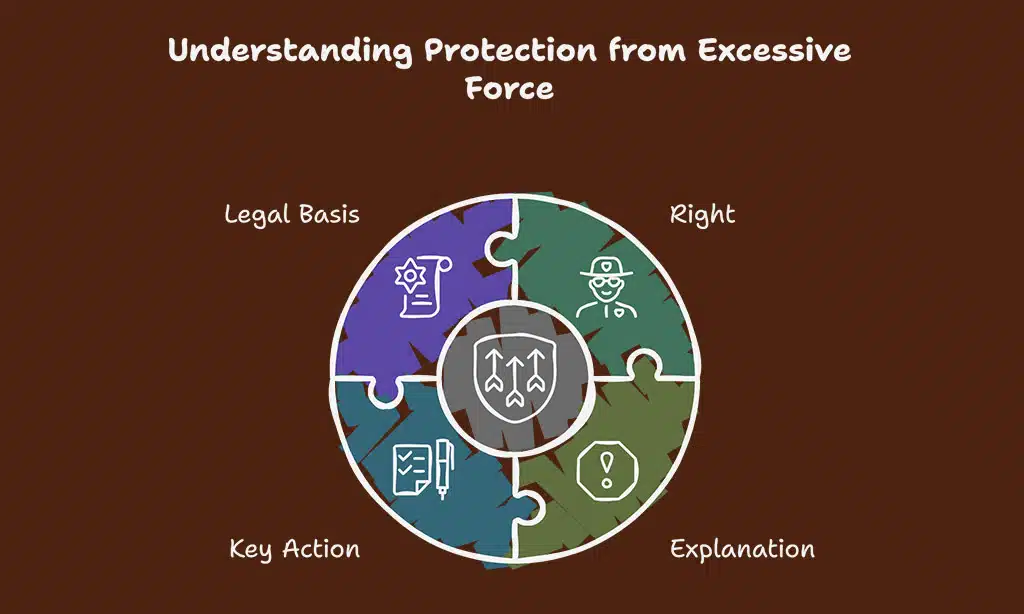Navigating encounters with law enforcement can be intimidating, but understanding your legal rights when dealing with the police is crucial for ensuring you are treated fairly. These rights are not only designed to protect your safety and freedom, but also to help prevent any potential abuses of power by police officers.
Whether you’re being questioned, detained, or arrested, knowing your rights will help you make informed decisions and minimize the risk of violations.
In this comprehensive guide, we will explore 12 essential legal rights that are guaranteed to you under U.S. law.
From the right to remain silent to the right to record interactions, each right is designed to help protect you from illegal actions by law enforcement.
We’ll break down each right with practical examples, key takeaways, and actionable steps that can be used in real-life scenarios.
By the end of this article, you’ll have a deeper understanding of the legal rights you have when dealing with the police and be empowered to exercise them confidently.
Right #1 – The Right to Remain Silent
The right to remain silent is one of the most well-known legal rights afforded to citizens when interacting with law enforcement. It comes from the Fifth Amendment, which protects against self-incrimination.
This right is especially crucial during police interrogations, where anything you say can be used against you in a court of law.
| Right | Explanation | Key Action |
| Right to Remain Silent | You have the right not to speak during police questioning. | Simply say: “I wish to remain silent.” |
| Legal Basis | Fifth Amendment of the U.S. Constitution. | Invoking this right protects you from self-incrimination. |
Practical Insights
When you’re stopped or questioned by the police, you have the right to remain silent. You are not required to answer any questions, and there is no obligation to provide information beyond your identity.
Even if you are innocent, speaking without legal counsel may unintentionally complicate your case.
How to Exercise Your Right
To invoke this right, simply say, “I wish to remain silent.” You don’t need to provide any further justification, and the police are required to stop questioning you once you assert your right.
If they continue to question you, the answers you give may not be admissible in court.
Example:
In the 1966 landmark case Miranda v. Arizona, the Supreme Court ruled that suspects must be informed of their right to remain silent and the right to an attorney during an arrest or interrogation.
This case fundamentally shaped how law enforcement handles arrests and questioning.
Right #2 – The Right to an Attorney
Under the Sixth Amendment, you have the legal right to an attorney during questioning or after you’ve been charged with a crime. If you can’t afford one, a public defender will be appointed to represent you.
This ensures that you have professional legal guidance throughout the criminal process.
professional legal guidance throughout the criminal process.
| Right | Explanation | Key Action |
| Right to an Attorney | You have the right to legal representation during police questioning or trial. | Request an attorney: “I want to speak with an attorney.” |
| Legal Basis | Sixth Amendment of the U.S. Constitution. | If you cannot afford one, an attorney will be provided. |
Why It’s Important
Having an attorney present during questioning can prevent the police from taking advantage of your inexperience or confusion.
An attorney can also negotiate bail, represent you in court, and help you understand the complexities of the legal system.
How to Request an Attorney
If you’re arrested or detained, you can ask for an attorney immediately. Say, “I want to speak with an attorney.” Once you’ve made this request, police must cease questioning until your lawyer is present.
Example:
In Gideon v. Wainwright (1963), the U.S. Supreme Court ruled that if you are unable to afford an attorney, one must be provided for you, reinforcing that your right to counsel is not dependent on your ability to pay.
Right #3 – The Right to Know the Reason for Your Arrest
When you are arrested, police are required to inform you of the reason for your arrest. This is a core legal right you have when dealing with the police.
You cannot be arrested without a legitimate cause, and you have the right to understand why you’re being detained.
you’re being detained.
| Right | Explanation | Key Action |
| Right to Know the Reason | You must be informed of the reason for your arrest. | Ask: “Why am I being arrested?” |
| Legal Basis | The right to be informed is protected under the Fourth and Sixth Amendments. | Ensures that arrests are justified and lawful. |
Practical Insights
If you are not informed of the reason for your arrest, you can request clarification. It’s important to remember that knowing the reason for your arrest is crucial because it will shape how your case is handled moving forward.
In some cases, failure to inform you of the reason for your arrest could lead to the case being thrown out.
How to Request the Reason for Your Arrest
If the police don’t tell you the reason for your arrest, you can ask, “Why am I being arrested?” If they refuse to answer, this may be grounds for legal action.
Being informed ensures transparency and holds law enforcement accountable.
Example:
In Dunaway v. New York (1979), the Supreme Court ruled that the police must have probable cause before making an arrest, and the individual must be informed of the reasons for their arrest.
Right #4 – The Right to Not Be Searched Without a Warrant
The Fourth Amendment protects citizens against unreasonable searches and seizures. If law enforcement wants to search you or your property, they typically must have a warrant issued by a judge or your consent.
There are exceptions to this rule, but this right still provides important protections against invasions of privacy.
| Right | Explanation | Key Action |
| Right to Not Be Searched | You cannot be searched without a warrant or your consent. | Say: “I do not consent to a search.” |
| Legal Basis | Fourth Amendment of the U.S. Constitution. | Protects against arbitrary searches. |
Practical Insights
Police can only search you or your belongings under specific circumstances: with a warrant, your consent, or if they have probable cause.
If police ask to search you or your property, you have the right to refuse unless they have a warrant.
How to Refuse a Search
Politely state, “I do not consent to a search.” You are within your rights to refuse, and the police must respect that unless they have a valid reason to search you.
If they proceed without consent or a warrant, you may have grounds to challenge the search later.
Example:
In Katz v. United States (1967), the Supreme Court ruled that the Fourth Amendment protects people from government intrusion in situations where they have a “reasonable expectation of privacy,” such as private conversations or personal property.
Right #5 – The Right to Refuse a Field Sobriety Test
If you are stopped on suspicion of driving under the influence (DUI), you have the right to refuse a field sobriety test.
While refusing the test may lead to a penalty, such as a driver’s license suspension, you are not required to comply with the test itself.
| Right | Explanation | Key Action |
| Right to Refuse a Sobriety Test | You do not have to submit to field sobriety tests. | Say: “I do not consent to the test.” |
| Legal Basis | Implied consent laws vary by state, but refusal often carries civil penalties. | Refusal may lead to license suspension but not criminal penalties. |
Practical Insights
Refusing a sobriety test doesn’t carry criminal charges on its own, but it may result in other penalties, such as an automatic license suspension in some states.
However, refusing can also prevent the police from using evidence from the test against you in court.
How to Refuse
If you are asked to submit to a sobriety test, you can simply say, “I do not consent to the sobriety test.” Be aware of state laws, as some states have “implied consent” laws that may penalize refusal.
Example:
In Birchfield v. North Dakota (2016), the U.S. Supreme Court ruled that states could not criminalize the refusal of a breathalyzer test, but they could impose civil penalties like a driver’s license suspension for refusal.
Right #6 – The Right to Record Police Interactions
You have the right to record police encounters in public spaces. This right, protected under the First Amendment, allows you to document law enforcement interactions to ensure accountability.
| Right | Explanation | Key Action |
| Right to Record Police | You can record police interactions in public spaces. | Say: “I am recording this interaction for my safety.” |
| Legal Basis | First Amendment of the U.S. Constitution. | Protects the right to document police activities. |
Practical Insights
Recording police interactions can provide important evidence if there are disputes about what occurred. However, it is important to do so safely and without interfering with police duties.
How to Record
Make sure your phone or device is visible and that you inform the police that you are recording.
If you are stopped for recording, you can calmly assert your right, saying, “I am recording this interaction for my safety.”
Example:
In Glik v. Cunniffe (2011), the First Circuit Court of Appeals ruled that the public has the right to record police officers performing their official duties in a public space.
Right #7 – The Right to a Fair Trial
If you are charged with a crime, you are guaranteed the right to a fair trial under the Sixth Amendment.
This means that your case will be heard by an impartial jury, and all legal procedures must be followed.
| Right | Explanation | Key Action |
| Right to a Fair Trial | You are entitled to a fair and public trial. | Ensure you have legal representation and an impartial jury. |
| Legal Basis | Sixth Amendment of the U.S. Constitution. | Guarantees the right to due process. |
Why It’s Important
A fair trial ensures that the judicial process is just, and it gives you the opportunity to present your defense. It also prevents arbitrary punishment without due process.
How to Ensure a Fair Trial
Ensure that your trial is conducted fairly by having competent legal representation, understanding the charges, and being prepared to contest any violations of your rights.
Example:
In Furman v. Georgia (1972), the Supreme Court ruled that the death penalty was being applied in an arbitrary manner and violated the Eighth Amendment, leading to changes that would ensure a fair trial in death penalty cases.
Right #8 – The Right to Be Free from Excessive Force
You are protected by the Eighth Amendment from excessive or unnecessary force by law enforcement officers.
The use of excessive force can include physical violence, threats, or the use of weapons that are disproportionate to the situation.
| Right | Explanation | Key Action |
| Right to Be Free from Excessive Force | Police cannot use excessive force during arrests. | Document the incident and file a complaint. |
| Legal Basis | Eighth Amendment of the U.S. Constitution. | Protects against cruel and unusual punishment. |
Practical Insights
If you experience excessive force, try to remain calm and avoid escalating the situation. You can file a complaint or take legal action afterward to hold officers accountable.
How to Protect Yourself
If you believe the police are using excessive force, try to document the incident, remain calm, and file a formal complaint with the police department. Legal recourse is available for victims of excessive force.
Example:
In Tennessee v. Garner (1985), the Supreme Court ruled that police officers could not use deadly force to stop a fleeing suspect unless there was a significant threat to public safety, emphasizing the protection against excessive force.
Right #9 – The Right to Habeas Corpus
The right to Habeas Corpus ensures that no one can be detained without legal justification. If you are detained, you have the right to challenge the legality of your detention in court.
| Right | Explanation | Key Action |
| Right to Habeas Corpus | You have the right to challenge unlawful detention. | Contact an attorney to file a writ of habeas corpus. |
| Legal Basis | Habeas Corpus laws protect against unlawful imprisonment. | Prevents indefinite detention without trial. |
Why It’s Important
Habeas Corpus prevents unlawful imprisonment and ensures that authorities have a valid legal reason for holding you in custody. Without it, people could be held indefinitely without charges.
How to Use Habeas Corpus
If you’re unlawfully detained, you can file a writ of habeas corpus, which orders the government to justify the detention before a court.
Example:
In Hamdi v. Rumsfeld (2004), the Supreme Court ruled that U.S. citizens held as enemy combatants had the right to challenge their detention through Habeas Corpus.
Right #10 – The Right to Bail
After an arrest, you generally have the right to bail. Bail allows you to be released from custody while awaiting trial, provided you meet the bail conditions set by the court.
| Right | Explanation | Key Action |
| Right to Bail | Bail allows for temporary release pending trial. | Pay the set bail amount or request bail reduction. |
| Legal Basis | Eighth Amendment prohibits excessive bail. | Ensures individuals are not held without reason. |
Practical Insights
Bail ensures that those arrested have the ability to prepare for trial without being unnecessarily detained. Bail amounts are set based on the severity of the crime and the perceived flight risk.
How to Secure Bail
If you are arrested and bail is set, you or someone on your behalf can pay the amount to secure your release. If you can’t afford the bail, you may apply for a bail reduction or explore other release options.
Example:
In Stack v. Boyle (1951), the U.S. Supreme Court ruled that bail should not be excessive and should be based on the crime charged, ensuring that individuals are not held for unreasonable amounts of time before trial.
Right #11 – The Right to Be Informed of Your Rights
Upon arrest, the Miranda rights must be read to you, informing you of your rights to remain silent and to an attorney. Failure to do so can lead to a case being thrown out.
| Right | Explanation | Key Action |
| Right to Be Informed of Rights | You must be informed of your Miranda rights upon arrest. | If not informed, you can challenge the statements made during interrogation. |
| Legal Basis | Miranda v. Arizona (1966) established the need for rights to be read during arrest. | Protects you from coerced confessions. |
Why It’s Important
Miranda warnings ensure that individuals understand their rights before making any statements that could incriminate them.
What to Do if Your Rights Are Not Read
If your rights aren’t read, you can challenge any statements you made during the interrogation in court.
Example:
In Miranda v. Arizona (1966), the U.S. Supreme Court established the requirement for officers to read Miranda rights to a suspect before questioning, protecting individuals against self-incrimination.
Right #12 – The Right to Not Be Discriminated Against
You are entitled to equal protection under the law, meaning you cannot be discriminated against by law enforcement on the basis of race, ethnicity, religion, or gender.
| Right | Explanation | Key Action |
| Right to Equal Protection | You are entitled to be treated equally by law enforcement. | Report discriminatory behavior to authorities or take legal action. |
| Legal Basis | Fourteenth Amendment guarantees equal protection under the law. | Protects against racial, gender, and other types of discrimination. |
How to Handle Discrimination
If you believe you’ve been discriminated against, report the incident to authorities or take legal action. Discrimination during police encounters is illegal and punishable.
Example:
In Ferguson v. City of Charleston (2001), the Supreme Court ruled that drug testing in hospitals without consent was unconstitutional, as it violated the Fourth Amendment and discriminated against African American women.
Takeaways
Knowing and asserting the legal rights you have when dealing with the police can ensure that your interactions with law enforcement are fair, lawful, and transparent.
By understanding these rights, you can better protect yourself from unlawful treatment, avoid mistakes during encounters, and ensure a just process if you ever find yourself in a legal situation.
Asserting your rights may seem daunting, but remaining calm and respectful will help maintain the integrity of the situation.
Remember, being informed is your best defense. Stay educated about your rights and continue to advocate for your freedoms.






































